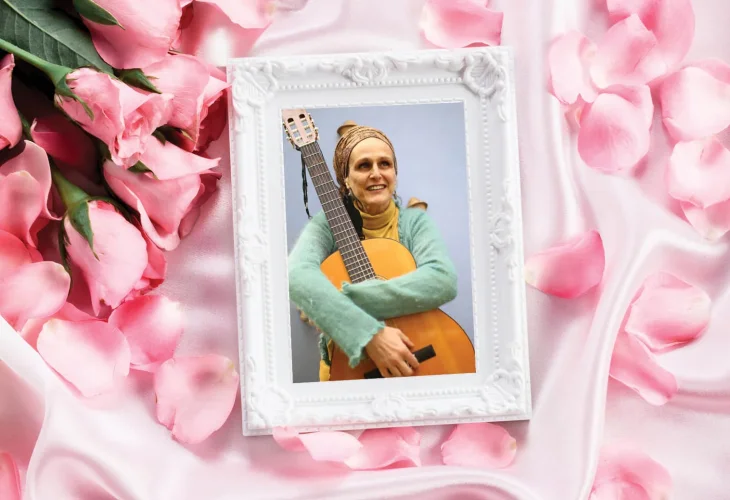Personal Stories
Finding Her Inner Voice: A French Singer’s Transformation into a Proud Jewish Woman in Jerusalem
A story of identity, music, faith, and the life-changing power of listening to the soul
 Hannah bat Yael (Photo: Hadar Alfasi)
Hannah bat Yael (Photo: Hadar Alfasi)If you had met Chana bat Yael during the years she lived in France, you likely wouldn’t have noticed anything Jewish about her at all — because there was no external sign of it. “There was absolutely no Judaism in our home,” she recalls with sadness. “The only ‘tradition’ my parents passed down was the memory of the Holocaust. Other than that, we kept nothing. No holidays, no Yom Kippur, no Chanukah, no Passover, and certainly no Shabbat. We were completely disconnected from anything Jewish.”
And yet, despite this disconnect, Chana felt something missing in her life. She longed for a connection to her Jewish roots. At the time, she didn’t even know how to explain it to herself.
A Journey of Searching
“At 17, I heard about something called ‘Passover’ for the first time,” Chana says. “It came up because my father suddenly mentioned it in conversation. I didn’t understand what it was, and I didn’t think it had anything to do with me.”
At that stage in her life, music interested her far more than unfamiliar conversations about Jewish history. “I come from a very musical family,” Chana explains. “Since I was little, I was used to hearing my father playing the guitar and singing French hits. My mother also came from a very musical background. Her family was deeply involved in music theory, and her mother conducted children’s choirs during the Holocaust — these were Jewish children whose parents had been deported. She hid them and helped them survive by teaching them to sing.”
Chana naturally found her place in the world of music. “When I was little, my grandmother taught all the cousins to sing. But while everyone treated it as a hobby, I decided to pursue it seriously. I took private lessons and later enrolled in a music school for two years. As I learned more, I realized that singing is much more than producing sound — it's performing, connecting with an audience, and so much more. I began performing on large stages across France.”
At the same time, she slowly began exploring Judaism. “I asked questions, looked for answers, read books, met observant people. Externally my life looked the same, but internally I was discovering my Jewish identity. The traditions started speaking to me. I even fell in love with Hebrew letters and Hebrew songs. I sang them constantly and felt a deep connection.”
But then something surprising happened. “The more I connected to my inner world and my values, the more I felt that performing on stage wasn’t my real calling. I felt uncomfortable standing on a stage showing everyone how well I could sing. I wanted to use my voice for something more spiritual, more meaningful. I just didn’t have the words for it yet.”
 (Photo: shutterstock)
(Photo: shutterstock)From France to Israel
Around that time, Chana was offered a trip to Israel. “I came to Israel and fell in love,” she says. “A few years later I returned, and then again, and again. I traveled all over the country, but most of all I connected to Jerusalem. I even wrote a song about it, ‘Yesh Li Makom.’”
At age 33 she made the big decision: “I realized there was nothing left for me in France. I was amusingly torn between moving to India or to Israel… but my soul chose the Holy Land. From the moment I arrived, I knew I would live in Jerusalem.” She studied Hebrew in an ulpan and enrolled in an oriental music school.
Once living in Jerusalem’s Nachlaot neighborhood, Chana felt a deeper inner pull toward more change. “I arrived single, but I very much wanted to marry and build a family. I knew nothing about modesty, but I began dressing modestly. I began keeping Shabbat.”
She also began teaching music — but left the stage. “Since I became observant, it was clear that if Jewish law prohibits singing in front of men, I wasn’t going to do it. Overnight, I left the performing world and started working in elderly care and house cleaning.”
But then the melodies returned. “After about two years, melodies started coming down to me — literally from heaven, connecting with verses from the prayers. Until then, I struggled with prayer because I didn’t understand all the words. When I set the words to music, I suddenly understood them. I even started writing my own Hebrew songs. Eventually, I opened my home to students and formed learning groups.”
Many women came to her with emotional or physical challenges.
“Through singing, I tried to help them. That’s how I discovered the therapeutic power of the voice. I realized that singing could be spiritual healing.”
Today Chana emphasizes: “I didn’t invent this. The idea of the ‘inner voice’ has always existed in music. But over the years I discovered that the voice can be a therapeutic tool — just as powerful as psychological methods. The voice is not only external. Once you understand that, everything changes.”
A New Life in Israel
At age 38 Chana met her husband and built the family she dreamed of. “For years I focused on raising the children. Now that they are older, I’ve reopened my home in Nachlaot to women who want to learn how to listen to their own inner world.”
“Today I understand that my inner voice was speaking to me even back in France — I just didn’t know how to recognize it. Every day I thank God for bringing me to this place, and for teaching me to listen to the voice inside.”

